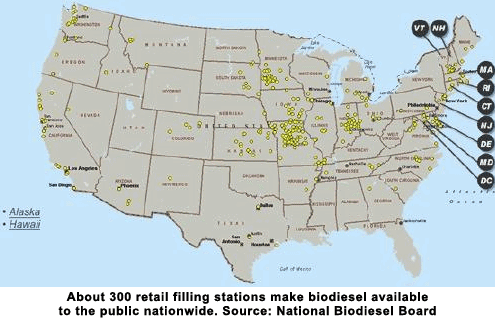 Auburn Hills, MI - Each new 2005 Jeep® Liberty Common Rail Diesel (CRD) sport-utility vehicle rolling off the assembly line will be fueled with 5 percent biodiesel, as Chrysler Group takes the lead in encouraging use of clean, renewable fuels made from plants.
Auburn Hills, MI - Each new 2005 Jeep® Liberty Common Rail Diesel (CRD) sport-utility vehicle rolling off the assembly line will be fueled with 5 percent biodiesel, as Chrysler Group takes the lead in encouraging use of clean, renewable fuels made from plants.
Biodiesel fuel is produced from vegetable oil, in this case soybeans grown in Ohio, the home state of the Jeep Liberty plant in Toledo. The first Liberty diesel will be produced in November.
"This is an important first step in encouraging wider use of these clean, renewable, environmentally-friendly fuels in the United States,” said Dieter Zetsche, Chrysler Group President and CEO.
The Jeep Liberty diesel, the first diesel-powered mid-size SUV to be offered in the United States, will hit the market in late 2004. It will be powered with a 2.8-liter four-cylinder engine and equipped with automatic transmission and 4-wheel drive capability.
The Liberty takes advantage of new CRD technology that significantly improves efficiency and reduces emissions by exactly calibrating the amount and pressure of fuel injected into the engine’s combustion chambers. The Liberty CRD diesel will achieve 22 mpg city and 27 mpg highway, overall approximately 30 higher than Liberty's comparable 3.7-liter V-6 gasoline engine.
In addition to 30 percent reduction in fuel consumption, diesel engines also reduce emissions of greenhouse gases by 20 percent compared with gasoline engines, Zetsche noted.
“With biodiesel, we can increase these benefits even further. And because biodiesel is made from renewable resources, we further reduce our dependence on petroleum for our transportation needs,” Zetsche said.
Biodiesel fuel reduces emissions of particulate matter, hydrocarbons and carbon monoxide. In addition, the biodiesel portion of the fuel is virtually carbon dioxide neutral; that is, the amount of carbon dioxide released when the fuel is burned is matched by the amount of carbon dioxide absorbed by soy plants during growth. Carbon dioxide is a greenhouse gas that has been linked to the potential for climate change.
Dodge Ram diesel pickup trucks have run successfully on B20 (20 percent biodiesel) in fleets required to use alternative fuels by the Energy Policy Act of 1992 (EPACT). However, there are currently no standards to guarantee consistent quality of B20 fuels. Thus, DaimlerChrysler currently recommends its diesel vehicles be run on a biodiesel blend of maximum 5 percent (B5).
The company is working with the biodiesel industry, petroleum industry, government, and standard-setting organizations to establish standards for biodiesel.
Conventional diesel fuel is currently available in about one-third of all filling stations in the United States.
Biodiesel blends of up to 5% concentration (B5) are available in public fueling stations at certain locations across the country, particularly in areas with substantial soybean farming. B5 fuels are already widely used in Chrysler Group diesel engine vehicles in Europe, where DaimlerChrysler has gained considerable experience with the fuels.
Next year, 2 percent biodiesel (B2) will be required for all diesel fuel in Minnesota. Missouri and Delaware are considering similar mandates.
Visit www.biodiesel.org to learn more about Biodiesel